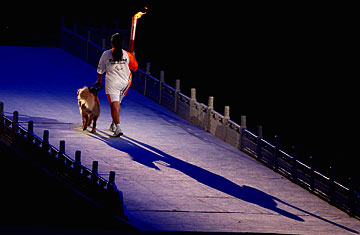
Ping Yali, China's first Paralympic Gold medalist, walks with the torch during the Opening Ceremony for the Beijing 2008 Paralympic Games on Sept. 6
For most viewers, the dramatic pinnacle of the Sept. 6 Beijing Paralympics opening ceremony came when Hou Bin, a one-legged track athlete, spent five minutes pulling himself and his wheelchair 20m in the air by rope and pulley to light the Olympic cauldron. But to Song Yanan the highlight was the moment when Ping Yali, who as a blind long jumper became China's first Paralympic champion in 1984, carried the flame with the aid of a guide dog named Lucky. "I couldn't take my eyes off them," says Song. "I was really excited, and also a little nervous. There were so many people, and so much noise. But they did great. Yali did great; Lucky did great."
She has a right to be proud. Song trained Lucky, one of China's first seeing-eye dogs and the first in the capital. Lucky's appearance at the Paralympics opening ceremony was a big chance to promote a kind of assistance for the disabled that didn't exist in China until recently. When Lucky came to Beijing last year, Ping complained on her blog that the Golden Retriever was technically banned under a Beijing rule against large dogs in public places. Police allowed Ping to keep Lucky at her side, but required that she only go out with the dog while accompanied by a sighted person. "I thank them for their benevolence," Ping wrote. "But if I have a guide next to me, why do I need a guide dog?"
In April, a temporary regulation was put in place to allow guide dogs in public places during the Paralympics. The blind and their supporters say that's a small example of how the Paralympics could help improve the lives of China's disabled. "A blind lady alone with a dog, that's also a symbol," says Jean Van Wetter, China director for Handicap International, an NGO that works with the disabled. "The Paralympics, if accompanied by the right public awareness campaign, that's very powerful."
The disabled have traditionally been marginalized in China. Ahead of the Olympics, organizers issued an official apology for a manual cautioning volunteers that the disabled can have "unusual personalities" and can be "stubborn and controlling." Beijing alone is home to nearly 1 million disabled, but they're a largely invisible part of the population. Those that can work are funneled into the few jobs that are open to the disabled, like paraplegics who can drive three-wheeled motor taxis or those who are sight-impaired and work in massage parlors. The Paralympics offers the hope that watching disabled athletes compete will change old attitudes and improve opportunities for the nation's 83 million handicapped. "I think the Paralympics is great, because it shows that people with disabilities like us are pretty much like normal people," says Fan Chunhe, 23, who has been blind since birth. He came to Beijing five years ago from his village in the mountains of Inner Mongolia. "I wanted to go out into society," Fan says. "In the mountain valley there was no opportunity to work." In Beijing, he found a job as a masseur. "As a blind person, massage is something we can do. We'd like to do other work," he says. "Others can do all sorts of work, but we are limited to this."
Still, experts give the Chinese government credit for making disability a political priority. Deng Xiaoping's son Deng Pufang, who was paralyzed after Red Guards threw him off a building during the Cultural Revolution, heads the China Disabled Persons Federation, offering a respected voice for the needs of the disabled. Ahead of the Paralympics, extensive investment went into upgrading Beijing's infrastructure. Lifts were added to the subway system, special taxis built for easier boarding by wheelchair users roam the streets, and Beijing's main airport was outfitted with $1.7 million worth of ramps, handicapped bathrooms and Braille signs, according to state media. The Forbidden City, which has long been impassable for wheelchair users, installed $585,000 worth of ramps and lifts ahead of the Paralympics, the China Daily reported. And in recent years, large cities like Beijing have been filled with miles of yellow sidewalk markers with special raised patterns to aid blind pedestrians.
But for all the infrastructure improvements, some worry that the top-down style of improving handicap facilities will slow change in the countryside, where most of China's disabled live. "It is good to have a showcase city in China that is more accessible than ever before," says Van Wetter. "The infrastructure is the expensive part, but in a way it is the easy part. To change attitudes and find innovative and local way to improve access in rural areas is more challenging. You have villages there are not even accessible by road."
On the Paralympic medal table, China's athletes have continued the dominance they showed at the Olympics. As of the fourth day of the Games, the country leads the U.K. and the U.S. in both golds and total medals. For Song, the dog trainer, another Paralympic victory would be that the temporary welcome given to guide dogs like Lucky be made permanent. "Whether it will continue, you can't tell," she says. "We hope it will."
